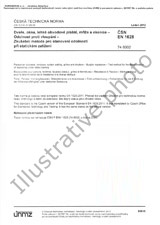We need your consent to use the individual data so that you can see information about your interests, among other things. Click "OK" to give your consent.
ČSN EN ISO 11063 (836707)
Soil quality - Direct extraction of soil DNA
Translate name
STANDARD published on 1.5.2021
The information about the standard:
Designation standards: ČSN EN ISO 11063
Classification mark: 836707
Catalog number: 511923
Publication date standards: 1.5.2021
SKU: NS-1023388
The number of pages: 24
Approximate weight : 72 g (0.16 lbs)
Country: Czech technical standard
Category: Technical standards ČSN
The category - similar standards:
Annotation of standard text ČSN EN ISO 11063 (836707):
present document specifies a method for direct extraction of DNA from soil samples to analyse the abundance and composition of microbial communities by various techniques of molecular biology including real-time quantitative PCR (qPCR). This method is mainly dedicated to agricultural and forest soils. This method can possibly not be suitable for soils rich in organic matter (e.g. peat soils) or soils heavily polluted with organic pollutants or heavy metals.
The direct extraction of DNA from soil samples provides unique insight into the alpha- and beta-diversity of microbial communities. Next-generation sequencing of amplicons obtained by PCR (polymerase chain reaction) amplification of soil DNA constitutes a promising domain which will in the near future contribute to the development of routine tools to monitor microbial communities in soil environments
Preview of the standard ČSN EN ISO 11063 (836707)
We recommend:
Technical standards updating
Do you want to make sure you use only the valid technical standards?
We can offer you a solution which will provide you a monthly overview concerning the updating of standards which you use.
Would you like to know more? Look at this page.




 Cookies
Cookies
